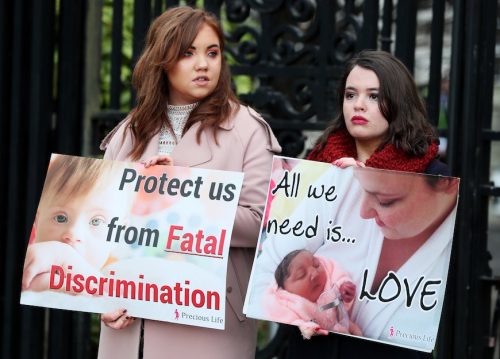LONDON (CNS) — The U.K. Supreme Court ruled that a bill to set up exclusion or “buffer” zones around abortion clinics in Northern Ireland does not violate the right to free expression upheld by the European Convention on Human Rights.
The court announced Dec. 7 that the legislation to ban “direct” and “indirect” pro-life “influence” within 100 meters of abortion facilities did not infringe the right to free expression upheld by the convention, to which the U.K. is a signatory.
It means that pro-life activists in Northern Ireland can legally be prohibited from quiet or silent prayer and from offering leaflets or advice about alternatives to abortions in the vicinity of any clinic.
The Abortion Services (Safe Access Zones) Northern Ireland Bill was introduced by former Green Party leader Clare Bailey in September 2021 and finally approved by the Northern Ireland Assembly March 24.
However, before it could take effect, it was referred to the Supreme Court in London by Dame Brenda King, the attorney general for Northern Ireland, who cited concerns that the legislation omitted a defense of “reasonable excuse” and was therefore incompatible with the European Convention on Human Rights.

Jeremiah Igunnubole, legal counsel for ADF UK, a Christian human rights group, said in a Dec. 7 statement that he was disappointed by the ruling. He said the court had failed “to protect the basic freedoms to pray or to offer help to women who may want to know about practical support available to avoid abortion.”
“Peaceful presence, mere conversation, quiet or silent prayer — these activities should never be criminalized in a democratic society like the U.K.,” said Igunnubole.
“The criminalization of any kind of ‘influencing’ is vague, uncertain and reduces the threshold of criminality to an impermissibly low level,” he continued.
“Northern Ireland’s broadly drafted law hands arbitrary power to police officers, with the inevitable consequence being the unjust arrest and prosecution of those expressing pro-life views, even though such views are protected under domestic and international human rights law,” he added.
ADF UK has also expressed the fear that the ruling will encourage pro-abortion politicians on the British mainland to press ahead with similar legislation in England, Wales and Scotland, where until now buffer zones have been introduced by individual local authorities, with a total of five operating in different parts of the country.
In the House of Commons, an amendment to the Public Order Bill has already been introduced to extend exclusion zones across the whole of England and Wales.
Clause 9 would prohibit members of the public from “influencing,” “advising,” “persuading,” “informing,” “occupying space” or even “expressing opinion” within the vicinity of an abortion facility.
The courts would have power to jail people convicted of such offenses for up to two years, if the bill passes.
Gillian Mackay, a Green Party politician, intends to introduce similar legislation in the Scottish Parliament.






















